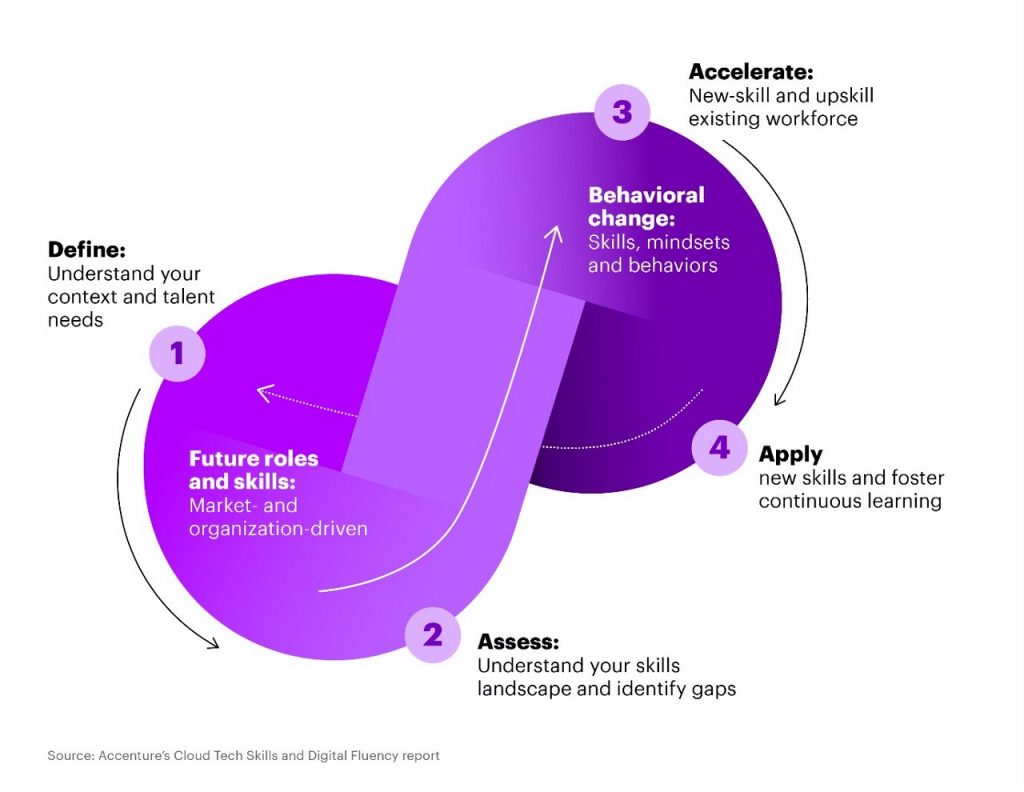Other parts of this series:
With cloud skills of all kinds in hot demand across many industries, banks are having to come to grips with an uncomfortable truth. Hiring, on its own, will not provide them with the skills they need to maximize the value of the cloud.
Our recent Modern Cloud Champions research found that the future cloud leaders in banking will invest as much in their people as their technology to transform their businesses with the cloud. And this investment is likely to be rewarded. Another Accenture survey—this one a cross-industry study—revealed that cloud leaders that transformed their people along with their technology achieved an average 60 percent higher ROI on their cloud investments than those that focused solely on the technology.
My previous post looked at the specific must-have skills identified by Accenture analysis for cloud success. In this post, I’ll walk through our four-step framework for growing these skills within an organization. Here’s a high-level visualization:

Before I jump into each step, I want to point out two important attributes of the framework.
The first is that it’s a cycle. The biggest benefit of the cloud for banks, in my view, is the greater organizational agility it makes possible. In fact, our “Mainframe migration to the Cloud in Banking” research—which we outline in the current issue of the Banking Cloud Altimeter—found that greater speed and agility is the strongest motivator for banks migrating their mainframe functions to the cloud. This makes sense, as agility is essential to compete in today’s fast-moving marketplace. As a loop, this framework reflects the commitment to constant improvement and adjustment that defines an agile mindset.
The second is that the first two steps in the framework focus on the organization as a whole and the market, while steps three and four zoom in on the people within the organization. Alternating between these two frames of analysis is no accident.

Banking Cloud Altimeter | Volume 6: Banks need a flight plan to navigate the cloud.
LEARN MOREAccenture’s cloud skilling framework
The first step is to define who you are and what you need. This should involve weighing business strategy, industry dynamics and geography. Needs assessment should anticipate your future technical “power skills” and behavior needs as well as future roles and a workforce plan to fill those roles. This plan should make use of the “four Bs”—build, buy, borrow or bot.
The second step is to assess what you have. This should include auditing your current talent profiles as well as the bank’s overall digital skills proficiency. The end of this step should identify your organization’s skill and capacity gaps as well as skill adjacencies.
The third step is to accelerate your new-skilling and up-skilling programs. These will focus on building your existing talent. The building component should incorporate personalized learning programs and curated content across a blended, multi-channel learning experience. Learners should be divided into cohorts and provided with coaching.
The fourth step is applying the new skills and fostering continuous learning. This involves both connecting the new skills to their appropriate tasks and conducting job proficiency tracking to monitor performance. This tracking should provide insights for updating the organization’s learning pathways and content curation—and for a renewed understanding of your context and talent needs, as described in step one.
This is a high-level overview of our cloud-specific talent and new-skilling framework. With cloud talent in short supply, using this framework to build your bank’s internal cloud skills can make a tremendous difference to the success of your cloud journey.
Contact me here to discuss how the framework can help your bank’s cloud journey. You can also find more on getting the most out of the cloud in Accenture’s Banking Cloud Altimeter.
Read moreDisclaimer: This content is provided for general information purposes and is not intended to be used in place of consultation with our professional advisors. Copyright© 2022 Accenture. All rights reserved. Accenture and its logo are registered trademarks of Accenture.











